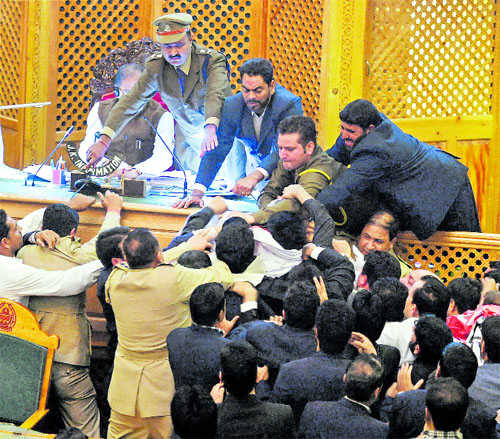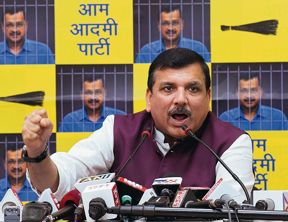
A file photo of MLAs try to snatch the mike from the Speaker’s table in 2015, during a protest for the protection of article 35A, in the J&K Assembly in Srinagar. PTI
Arun Joshi
THERE is no doubt that there are genuine fears in Kashmir over scrapping of Article 35-A of the Constitution of India that debars Indian citizens from buying immovable property and settling in the state. Legally, the right to settle permanently in Kashmir is reserved for the natives having the permanent resident certificate — a document that is based on the history of the family in the state. An attempt to do away with this critically important constitutional provision through legal means is taken as an ultimate step to annihilate the Kashmiri Muslim majority character of the state.
The case is with the Supreme Court where the Centre has not been able to come out with a defence of this provision that has great emotional, political and demographic value for the Valley. They fear a major loss if this Article is rendered as unconstitutional. An NGO has taken the plea that it was effected through a Presidential order in 1954 without Parliamentary approval. Their fear is that Indian Hindus would swamp their neighbourhood and they would lose ownership of their land and identity. This fear has been fed with meticulous planning in which the Peoples Democratic Party of Mehbooba Mufti and Peoples's Conference of Sajjad Gani Lone are a party, alongwith the opposition National Conference and separatists to warn the Indian nation against any "misadventure" of tampering with the special status of the state. Politically, Kashmiris are being told that their political ethos, rooted in the special status of the state as guaranteed in the Article 370, is under grave threat. The other part is more toxic. The Hindus would march in hordes into Kashmir and the religious identity of the local Muslims would be undermined. This legal contest is being propagated as a pernicious design to effect Israeli-type settlements in the Valley. The fear looks real when the overall mood and atmosphere in the country is reckoned with. Another view holds that Kashmir's emotional and political integration has not been possible because of the Article 370. This thesis erroneously envisages that it is a must to bring Kashmir under the Indian umbrella. This is a fallacy. These proponents are trying to peddle a partially true thesis to soothe the frayed emotions of the countrymen sick of violence and killing of Indian soldiers in the Valley. It stirs emotions of revenge. When countrymen are confronted with the constitutional reality that they cannot travel and settle in the state, their emotions for the integration of Kashmir are exploited in a frenzied manner. Both these optics are far removed from the reality in the Valley. Kashmir is in trauma. There is worry about the Valley’s unique Sufi culture getting supplanted by radicalism. There is a willingness to adopt the ideology of ISIS and Al-Qaida. It is not only proselytisers like Zakir Musa but also willingness on part of the youngsters to move on to that path. ISIS flags had started appearing seven years back but the then government dismissed it as mere fun by youngsters addicted to social media. This line was echoed by one and all, including the PDP, the Congress and the separatists. Separatists like Geelani and Yasin Malik’s refrain was that it is the handiwork of Indian agencies. When something has to be defined as a subject of hatred, it is dubbed “a design of the Indian intelligence agencies”. A close look at the situation reveals that militancy is becoming more lethal. Schools and colleges are shut. Businesses are closed more often. The academic calendar has gone haywire. Two arguments are used often. One, they want to keep the state purely Muslim majority. Secondly, if the “azadi” or freedom is not possible, greater autonomy can serve the limited purpose in retaining their identity. Kashmiri Pandits are natives of the Valley but have not been restored to their homes in the Valley for the past over 27 years. And, when there was a proposal to lodge them in transit camps, Kashmiri Muslim parties raised hue and cry. The state said nothing doing when a proposal for lodging soldiers from the state in a particular enclave was mooted. When natives are not being settled in the Valley while 35-A is there on the statute book , how would this atmosphere be conducive for Indians to come and settle there? It's all politics to escalate tensions between Delhi and Srinagar.
What does the contentious Article entail?
The Article 35-A was proclaimed by President Rajendra Prasad on May 14, 1954 on the advice of the Jawaharlal Nehru government to empower the Jammu and Kashmir legislature to define the permanent residents of the state and their entitlements. The Article was drawn from the Delhi Agreement of 1952 and Article 370 that confers special status to the state. The permanent resident is a citizen of the state as of May 14, 1954 and their descendants. This was the provision provided by Dogra rulers to prevent "non-permanent residents" of Jammu and Kashmir from settling in the state on a permanent basis. The permanent resident is entitled to
- Employment under the state government;
- Acquisition of immovable property in the state;
- Settlement in the state; or
- Right to scholarships and such other forms of aid as the state government may provide.
Controversy: The Article was issued via Presidential Order without debate and discussion in the Parliament, thus it doesn't carry the legal weight that other presidential orders issued after Parliament approval have. An NGO, Jammu Kashmir Study Centre, has moved the Supreme Court challenging validity of the order with a plea that it should be scrapped. Kashmir-centric parties say doing away with Article 35- A, with its roots in Article 370, would snatch the vestige of autonomy that the state enjoys in the Indian Union. They fear scrapping of this constitutional provision would stir a revolt and no one will even shoulder the Tricolour in Kashmir. The RSS view is that the Tricolour would be held aloft when Article 370 is done away with.



























